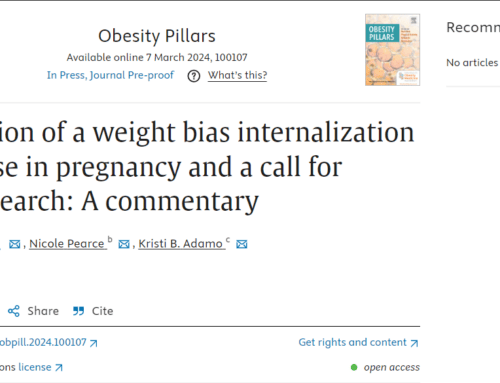OPEN LETTER
Manitoba House Leaders and Members of the Legislative Assembly,
On behalf of Obesity Canada’s 15,000 professional members and 20,000 public supporters, we are writing to express our disappointment with the outcome of yesterday’s Manitoba Committee Meeting where Bill 216 was voted down (6-4). We urge Manitoba House Leaders to reconsider this position, or to at least provide an evidence-based explanation why this bill should not go forward to a third reading.
It is Obesity Canada’s position that we have sufficient evidence required to necessitate the passing of this bill. Considering that 24.5% of adults in Manitoba are classified as having obesity, Bill 216 may afford more than 330,000 adults important protections under the law. As importantly, it will positively impact the lives of the approximately 13% of Manitoban children who live with obesity.
Obesity has long been misunderstood, trivialized and stigmatized as a simple “lifestyle” issue that can be effectively addressed by the mantra of “eat-less-move-more”. This simplistic view of obesity disregards both the lived experience of persons with obesity as well as the vast body of scientific evidence showing that, like other chronic diseases, obesity is a heterogeneous condition resulting from the complex interaction of a multitude of socio-psycho-biological factors that promote excessive weight gain and ultimately impair health. Most importantly, once established, powerful neuro-hormonal factors effectively defend our bodies against weight loss, thereby often making obesity a life-long problem, where weight regain (or relapse) is the rule rather than the exception.
These important research findings have now led to the formal recognition of obesity as a chronic disease by the World Health Organization, the Canadian Medical Association, the American Medical Association and many scientific organizations such as Obesity Canada, The Obesity Society (US), the European Association for the Study of Obesity, and the World Obesity Federation.
In addition to their condition being trivialized as a simple “lifestyle” problem, people living with obesity face widespread discrimination – on par with other forms of discrimination such as racism or homophobia. Moreover, obesity is the number-one reason for teasing and bullying in childhood. As with other forms of discrimination, research shows that the pervasive social stigma associated with obesity markedly affects individuals’ overall social and economic well-being and can significantly increase their morbidity and mortality. Of particular concern is the evidence showing that weight bias and discrimination disproportionately affects women with regards to opportunities in education, employment and healthcare.
The prevalence of weight discrimination has increased by 66% over the past decade, and is comparable to rates of racial discrimination. Weight discrimination manifests across multiple settings such as healthcare, employment and education, the consequence of which are far-reaching.
- Elementary school children with obesity face 63% higher chance of being bullied
- 54% of adults with obesity report being stigmatized by coworkers
- 64% of adults with obesity report experiencing biased treatment by healthcare professionals
- 72% of images and 77% of videos in the media stigmatize persons with obesity
To prevent further stigmatization and discrimination of Manitobans living with obesity, we must include obesity as a protected area under the Human Rights Act. As a chronic disease, obesity needs to be a protected area just like other chronic disease, including HIV/AIDS.
On behalf of our 35,000 members and supporters, we ask that you reconsider the committee’s decision and move Bill 216 forward to a third reading. This bill can contribute to the health and social wellbeing of all Manitobans by promoting equitable opportunities to Manitobans living with obesity with regard to education, employment and healthcare. Moreover, Manitoba can become a progressive example for other provinces and territories to enshrine rights for people of all sizes within their human rights legislation.
We would very much appreciate the opportunity to present in front of house leaders in order to discuss current research findings on weight bias and discrimination, as well how/why obesity is a chronic disease and how Bill 216 can protect Manitobans living with obesity.
Kindest regards,
Dr. Arya M. Sharma, Scientific Director, Obesity Canada
Dr. Ximena Ramos Salas, Executive Director, Obesity Canada






